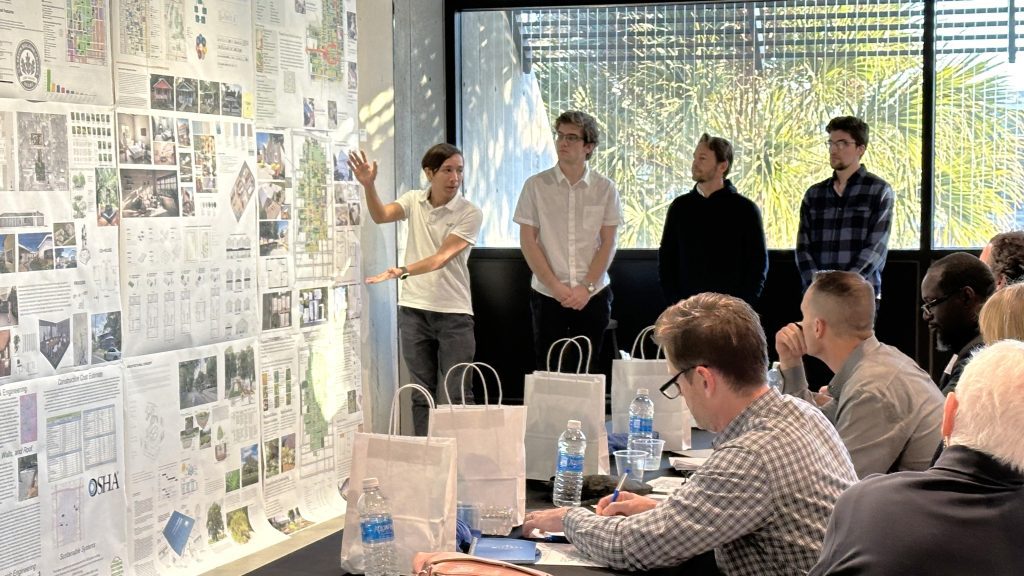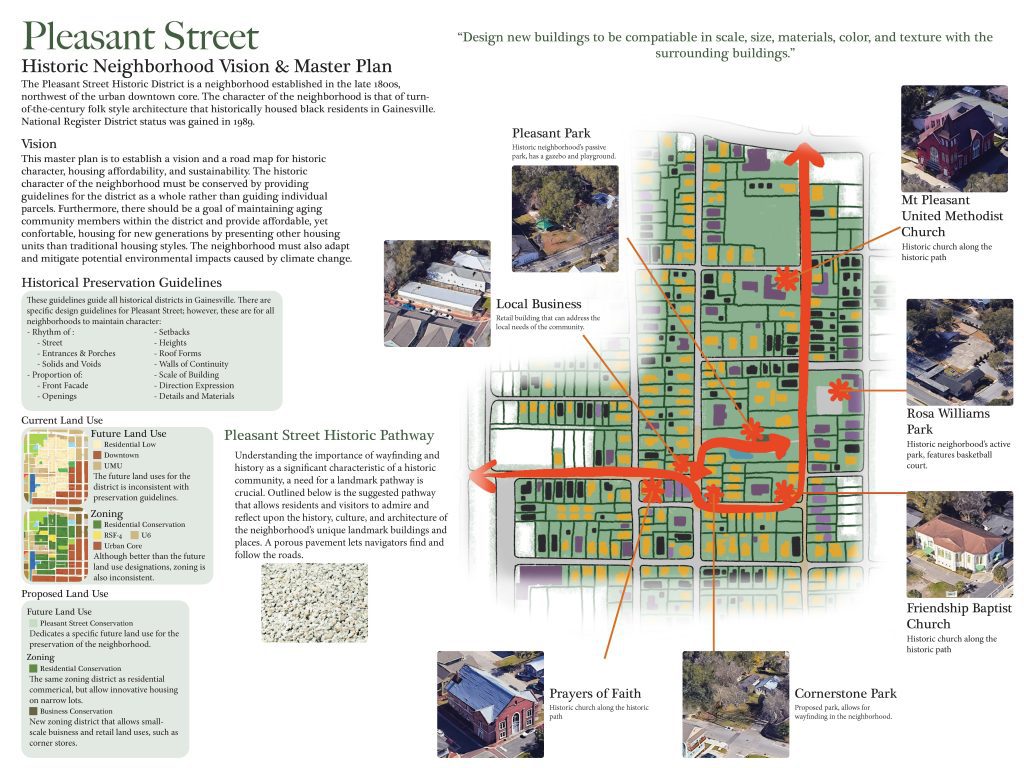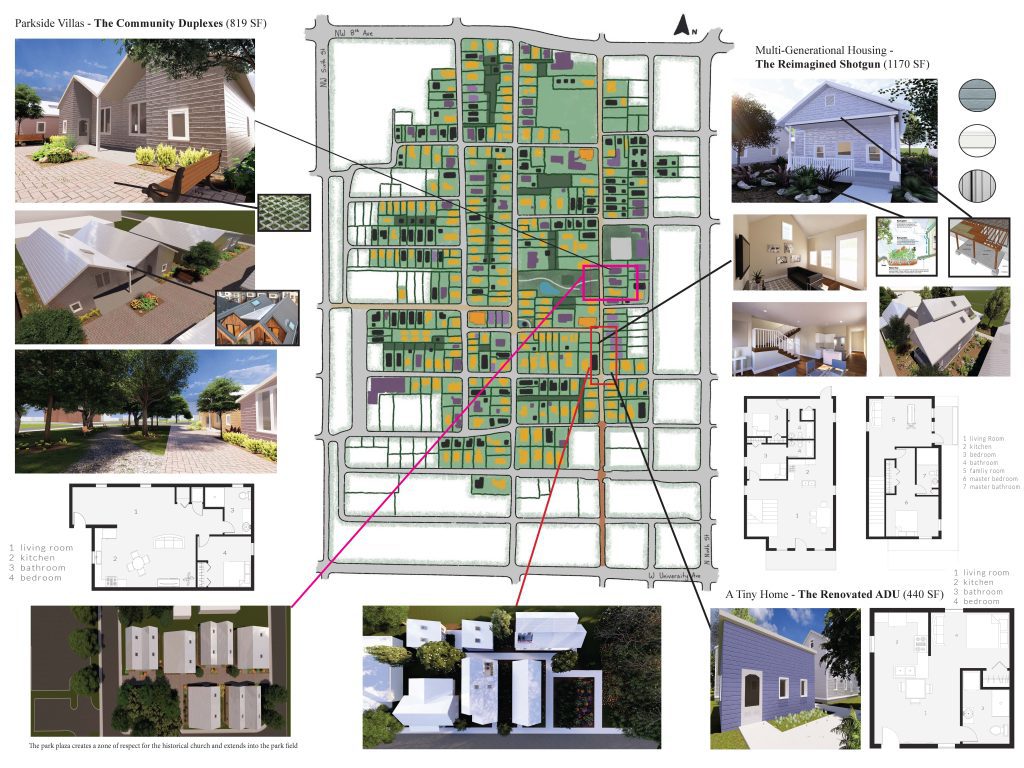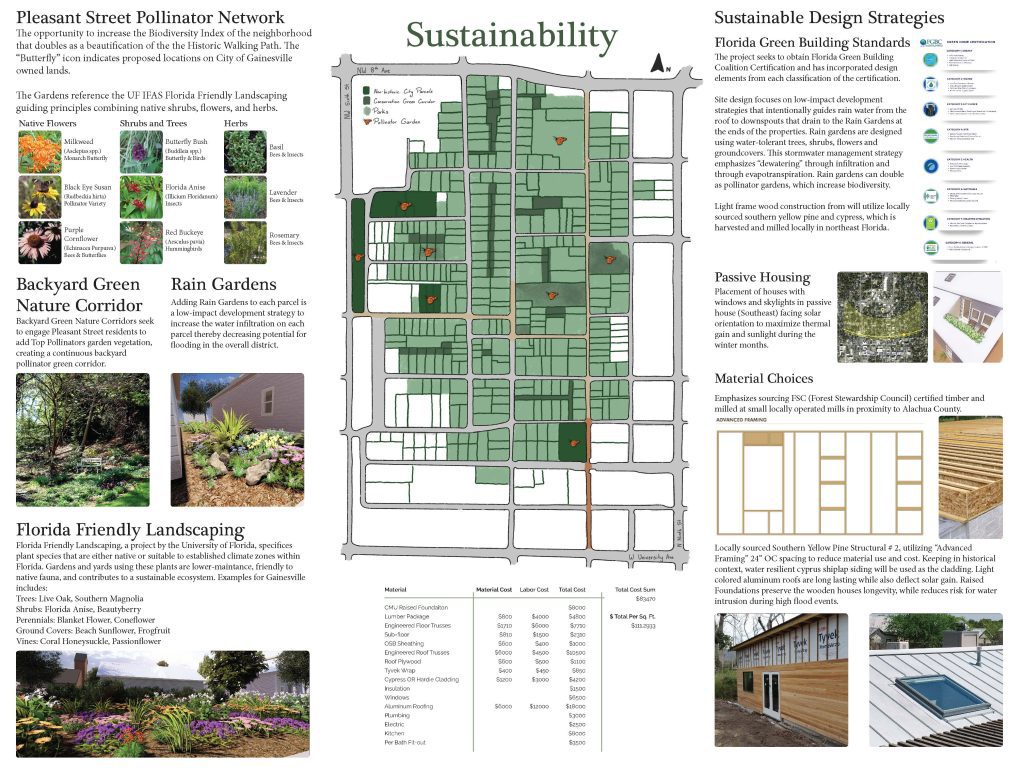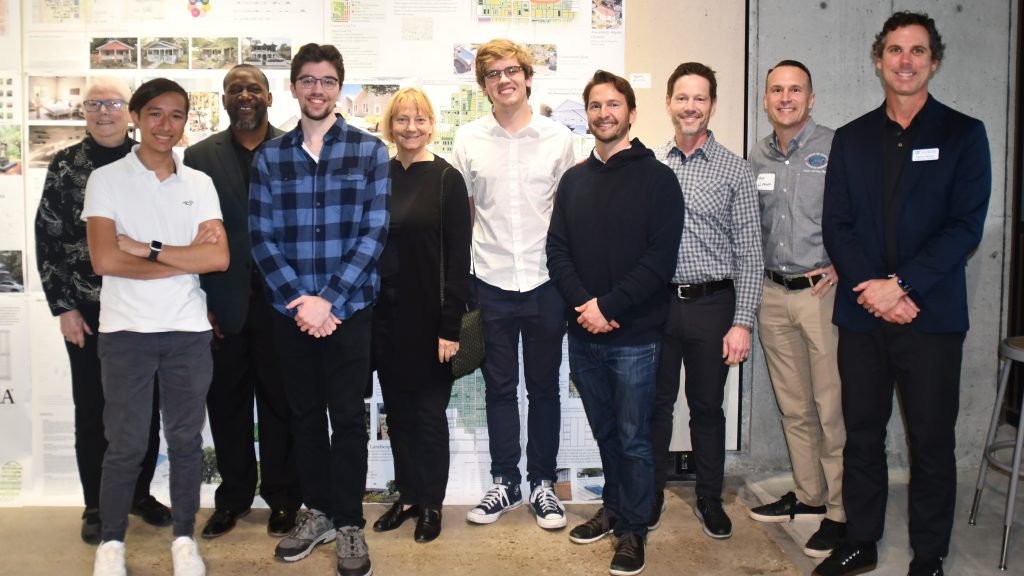
Thursday, February 1, 2024
By: Kyle Niblett
The quartet of Ryan Amsel, Andrew Pace, Sebastian Reina and Brady Schaffstein took home the grand prize of $6,000 this past weekend at the 31st Annual Witters Competition. Created in 1993 and endowed by Col. Arthur G. (BSBC ’41) and Beverly A. Witters, the University of Florida College of Design, Construction and Planning contest was created to offer students from each DCP discipline as well as the Herbert Wertheim College of Engineering an experience to work with different disciplines before they graduated.
“Every team’s project exemplified that different disciplines collaborating with a clear vision can craft wonderful harmonious ideas,” Reina said. “As a team, we made sure we supported one another throughout the competition and that every member’s skill was present within each aspect of our project.”
More than a dozen teams were tasked with establishing a vision and a road map for the Pleasant Street Historic District in Gainesville. Focusing on historic character, housing affordability, and sustainability, each group was made to conserve the historic character of the neighborhood by providing guidelines for the district rather than guiding individual parcels. Furthermore, there was a goal of maintaining aging community members within the district to provide affordable, yet comfortable, housing for new generations.
“As a resident of the Pleasant Street neighborhood, I appreciated the respect and sensitivity the students exhibited toward the neighborhood’s history and its historical significance,” said Dotty Faibisy, who served as a juror and judge on the Witters Committee. “I was extremely impressed with the students’ skills and knowledge. It was definitely a learning experience for me.”
The winning team won due to how they adapted and mitigated potential environmental impacts caused by climate change, while also understanding the importance of wayfinding and history as a significant characteristic of a historic community.
“To be recognized as winners of the competition provided me an affirmation of my growth during my time within DCP at UF,” Pace said. “It is a sense of satisfaction knowing that my hard work through the years has aided me well, and well enough to work alongside teammates of multiple disciplines to produce a worthwhile, comprehensive design plan.”
After celebrating 30 years of the competition last year, the Witters family is beyond proud of the three-decade plus legacy the competition has provided.
“It certainly is impressive to me how this event has grown since my time as a student,” said UF graduate Matthew G. Witters, grandson of Arthur and Beverly Witters. “Seeing how it has developed from the early years, I know my grandparents would be very proud of the work the college has done to grow this competition.”
Q&A with the Winning Team
What did it mean to win the competition?
“What an honor it was to win. As our team began working together, we had a dynamic that played to each other’s strengths. As an inter-disciplinary group, we brought skills that started to ignite creativity, perspective, and unforeseen opportunities for our project to take form. While I was hopeful that we would be a finalist team, I felt rewarded from the dynamic of learning, collaborating, and arbitrating various design strategies. So, when we got to the final submission, I felt quite confident that collectively, we had put together our diverse skillsets and created something viable for real world implementation. To be recognized as a top-three finalist was recognition enough. To win the competition though, we felt like everyone who participated had earned an opportunity to be recognized and share in the win. So, to all the students who participated in the competition, we won collectively.” – Ryan Amsel
“Winning certainly meant a lot to me. I have competed in various design competitions the past few years and have had no luck, so winning the Witters competition was extremely gratifying. It felt as if I could finally put those past defeats behind me. It also showed me that I should say ‘yes’ more often, as I almost didn’t compete out of fear of random teammates. I ended up having an incredible team that I learned so much from in those three days. It felt amazing to have our hard work pay off and to see everything come together in our final presentation.” – Brady Schaffstein
“We were really dedicated at finding that perfect balance of historic context, architectural design, and sustainability within a master plan framework. It was a master plan any neighborhood would be happy to have, and we are humbled that the Pleasant Street resident jurors agreed and selected us as the winning project.” – Sebastian Reina
What will you do with the prize money?
“The money will also help pay for my senior year study abroad in Vincenza, Italy.” – Brady Schaffstein
“I’m not one for excess spending, so I will probably either save the whole amount, or use it to save toward purchasing a more powerful computer that will greatly help me in handling rendering and modeling programs in the future!” – Andrew Pace
“For my program (Master of Architecture Studies in Sustainable Design), our cohort has an organized trip planned for Singapore and Bali in March. The tour will focus on green building and ecologically sustainable design strategies for the urban environment. So, the prize will buy my plane ticket!” – Ryan Amsel
“As a team, we chose to split it evenly. As for me, I’m not sure. Perhaps it would be responsible to save the money for a rainy day.” – Sebastian Reina
How did you feel after the competition was over?
“This competition was very much a team effort, and it has only reinforced my belief that working within the design profession should be stalwartly multi-disciplinary. Constraints and challenges can be frustrating, but also very fun to tackle. I had a great time and learned a lot through working with my team!” – Andrew Pace
“Honestly, I feel very rewarded from the learning I gained from working with a synergistic, dynamic team. It was a huge confidence boost to feel like the effort that I had been putting into my education could take a form that will be implementable in the near future.” – Ryan Amsel
“Overall, I had an incredible time with this year’s competition and really enjoyed examining the Pleasant Street historic area. It pushed me out of my comfort zone and taught me so many things about design and construction. I am truly thankful to my teammates and the faculty that ran the competition.” – Brady Schaffstein
What was your biggest takeaway from the 2024 Witters Competition?
“There were some excellent projects this year. I was especially surprised when another finalist team had a fellow urban planner! As a team, our different academic backgrounds really allowed us to peek into each other’s professions and see all the commonalities that we have.” – Sebastian Reina
“Given how busy we can be with our schoolwork, I know it can be hard to participate in extracurricular opportunities like this. Seeing so many people willingly join and work hard to produce great, serious proposals was very satisfying to watch and participate in. Every team had great approaches to the project, and I enjoyed them, and their poster breakdowns!” – Andrew Pace
“The project itself meant a lot to me, especially after spending over 20 hours analyzing and digitally modeling the site. What meant the most was seeing each of our specialties come together to accent one another; to create something that none of us could have created individually. I learned so much from my teammates in such a short amount of time that I will hold onto my education and profession.” – Brady Schaffstein
“It felt like every skillset and knowledge from years of learning was put into hyperdrive to figure out its place and relevancy. We kept saying the competition felt like “Top Chef,” meaning there was high pressure in the kitchen. I would do the competition again. Overall, it tests you on how you can perform at your top level.” – Ryan Amsel
